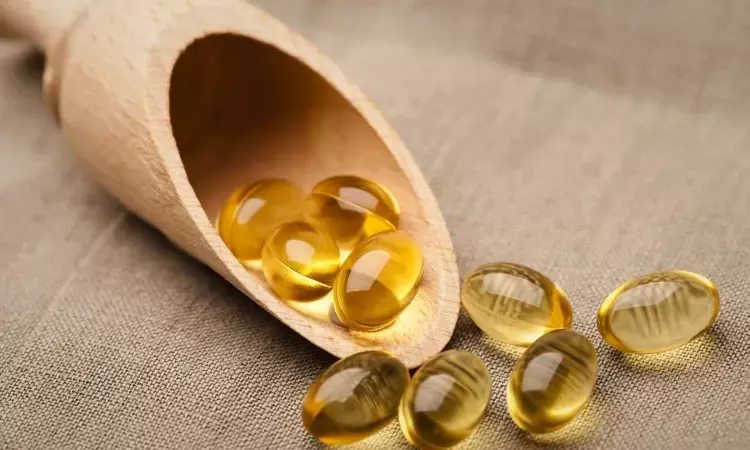- Home
- Medical news & Guidelines
- Anesthesiology
- Cardiology and CTVS
- Critical Care
- Dentistry
- Dermatology
- Diabetes and Endocrinology
- ENT
- Gastroenterology
- Medicine
- Nephrology
- Neurology
- Obstretics-Gynaecology
- Oncology
- Ophthalmology
- Orthopaedics
- Pediatrics-Neonatology
- Psychiatry
- Pulmonology
- Radiology
- Surgery
- Urology
- Laboratory Medicine
- Diet
- Nursing
- Paramedical
- Physiotherapy
- Health news
- Fact Check
- Bone Health Fact Check
- Brain Health Fact Check
- Cancer Related Fact Check
- Child Care Fact Check
- Dental and oral health fact check
- Diabetes and metabolic health fact check
- Diet and Nutrition Fact Check
- Eye and ENT Care Fact Check
- Fitness fact check
- Gut health fact check
- Heart health fact check
- Kidney health fact check
- Medical education fact check
- Men's health fact check
- Respiratory fact check
- Skin and hair care fact check
- Vaccine and Immunization fact check
- Women's health fact check
- AYUSH
- State News
- Andaman and Nicobar Islands
- Andhra Pradesh
- Arunachal Pradesh
- Assam
- Bihar
- Chandigarh
- Chattisgarh
- Dadra and Nagar Haveli
- Daman and Diu
- Delhi
- Goa
- Gujarat
- Haryana
- Himachal Pradesh
- Jammu & Kashmir
- Jharkhand
- Karnataka
- Kerala
- Ladakh
- Lakshadweep
- Madhya Pradesh
- Maharashtra
- Manipur
- Meghalaya
- Mizoram
- Nagaland
- Odisha
- Puducherry
- Punjab
- Rajasthan
- Sikkim
- Tamil Nadu
- Telangana
- Tripura
- Uttar Pradesh
- Uttrakhand
- West Bengal
- Medical Education
- Industry
Vitamin E beneficial for patients with polycystic ovary syndrome: Study

Iran: Vitamin E supplementation alone or combined with omega-3 or magnesium exerts anti-hyperlipidemic, anti-oxidant, and anti-inflammatory effects on patients with polycystic ovary syndrome (PCOS), new research featured in Scientific Reports has shown.
Recently, there has been rising attention to vitamin E's health benefits. PCOS is one of the most complex and common endocrine disturbances that affects about 6 to 25% of women of reproductive age. The disorder is characterized by hyperandrogenism, subfertility, and menstrual and ovulatory dysfunction. Vitamin E could possess anti-oxidative, anti-inflammatory, anti-hypercholesterolemic, anti-obesity, anti-hypertensive, and anti-hyperglycemic properties.
Against the above background, Hajar Heidari, Isfahan University of Medical Sciences, Isfahan, Iran, and colleagues summarized the effects of vitamin E supplementation or its combination with omega-3 or magnesium on PCOS.
For this purpose, the researchers searched the online databases for all available articles up to September 2022. The study included Randomized controlled trials (RCTs) investigating the effects of vitamin E supplementation alone, along with magnesium or omega-3, on glycemic and lipid profiles, inflammation and oxidative stress biomarkers, anthropometric measurements, hirsutism score, and hormonal profile in PCOS patients were included. The eligibility criteria were fulfilled by ten RCTs comprising 504 participants.
The study led to the following findings:
- Supplementation of Vitamin E alone or in combination with magnesium or omega-3 compared to placebo could remarkably decrease serum levels of TC (weighted mean difference: − 16.30 mg/dL), TG (− 18.27 mg/dL), LDL-c (− 12.84 mg/dL), TC/HDL-c ratio (− 0.52), hs-CRP (− 0.60 ng/mL), VLDL (− 5.88 mg/dL), hirsutism score (− 0.33) and significantly increase the levels of nitric oxide (2.79 µmol/L).
- The researchers did not find any significant effect on glycemic indices, HDL-c, hormonal profile, anthropometric measurements, and other inflammation or oxidative stress biomarkers.
The meta-analysis of 10 RCTs with 504 PCOS women demonstrated that vitamin E supplementation or vitamin E along with magnesium or omega-3 could significantly decrease hs-CRP, hirsutism score, and lipid profile (TC, TG, VLDL, TC/HDL-c, LDL-c), and an increase in the concentration of nitric oxide (NO).
Vitamin E supplementation and the co-supplementation of magnesium or omega-3 did not have any impact on hormonal profile, glycemic indices, other biomarkers of oxidative stress or inflammation, HDL-c levels, and anthropometric measurements. The positive effect of vitamin E in patients with PCOS might be independent of weight loss.
"Our results underscore the potential anti-oxidant, anti-inflammatory properties, and anti-hyperlipidemic properties of vitamin E on PCOS patients; therefore, this vitamin could be used as an adjuvant treatment for managing some complications and clinical manifestations of PCOS," the researchers wrote in their study.
Reference:
Heidari, H., Hajhashemy, Z. & Saneei, P. A meta-analysis of effects of vitamin E supplementation alone and in combination with omega-3 or magnesium on polycystic ovary syndrome. Sci Rep 12, 19927 (2022). https://doi.org/10.1038/s41598-022-24467-0
Dr Kamal Kant Kohli-MBBS, DTCD- a chest specialist with more than 30 years of practice and a flair for writing clinical articles, Dr Kamal Kant Kohli joined Medical Dialogues as a Chief Editor of Medical News. Besides writing articles, as an editor, he proofreads and verifies all the medical content published on Medical Dialogues including those coming from journals, studies,medical conferences,guidelines etc. Email: drkohli@medicaldialogues.in. Contact no. 011-43720751


